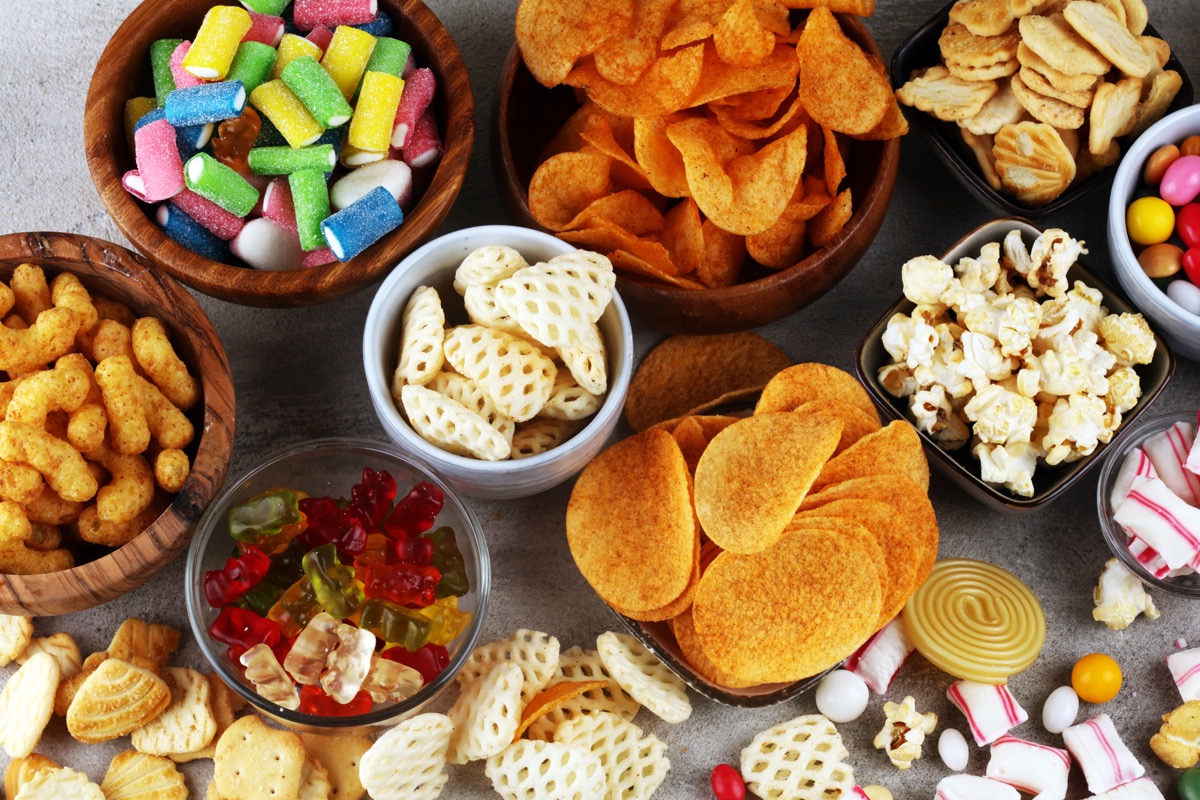The #1 Worst Food That Increases Inflammation, According to a Dietitian

Losing weight isn't the only reason you should eat healthily. While there is nothing wrong with wanting to lose a few pounds and feeling good in your skin (as long as you're doing it healthfully, of course), there are so many more healthy reasons to want to eat a good diet that isn't even linked to weight management. In fact, research shows that your diet can be directly correlated to an increased risk of chronic diseases due to inflammatory responses in your body—and it's all based on the types of foods you eat. That's why it's important to understand the worst food that increases inflammation in your body, so that you can fully understand the risks and how consuming this type of food can cause issues over time.
Ilana Muhlstein, MS, RDN, and a member of our medical expert board, says foods made with high fructose corn syrup, as well as artificial colors and flavors, are foods that will increase inflammation in the body. Some of the more popular foods that have these ingredients include regular soda and candy, like gummy bears.
"The surge of sugar and artificial ingredients spike blood sugar levels and bring upon an inflammatory response," says Muhlstein.
Why is it so bad to have inflammation in the body? Over time, constant inflammation can cause serious health issues, which is why it's important to understand why certain foods can increase that inflammatory response.

The problem with pro-inflammatory foods
If your body is constantly in a state of inflammation, and over time, it can lead to chronic inflammation. Chronic inflammation leaves your body constantly on high alert in order to fight against any of those "foreign" substances entering your body. It can damage the healthy cells, tissues, and organs in your body—which causes a risk of numerous diseases including cardiovascular disease, diabetes, rheumatoid arthritis, and many more.
No, we are not saying that eating one gummy bear will instantly cause disease—that's not exactly how it works. It's eating these pro-inflammatory foods on a consistent basis that can cause issues, and over a long period of time of eating a pro-inflammatory diet, your body's constant state of chronic inflammation can cause an increased risk of these types of diseases.
In particular, drinking soda and ingesting numerous chemicals can cause inflammation in your body because it is reacting to foreign substances. While soda and candy with high fructose corn syrup and chemicals are considered the worst food that increases inflammation, there are other types of foods to also not eat in excess. Refined carbohydrates (white bread, pastries), fried foods, red meat, processed meat, as well as margarine (shortening and lard) are all foods that can cause inflammation in the body and should be limited, according to Harvard Health.
Does "limit" mean never enjoying these foods at all? Of course not. Limiting these foods means enjoying them in moderation. Saving them for special events and for those "once in a blue moon" moments is a balanced way to stay healthy and still enjoy the foods you love, instead of overdoing it on these foods on a daily basis.
When it comes to those "daily basis" foods, following an anti-inflammatory diet would be best for your overall health and for decreasing the risk of developing these types of diseases. The University of Chicago Medicine says that following a Mediterannean and plant-based diet is best for protecting yourself against chronic inflammation. Focusing on foods that are high in antioxidants (which fight the free radicals causing damage to your body) is wise on a day-to-day basis and includes foods like nuts, olive oil, beans, fruits, and vegetables. Even a little bit of dark chocolate can give you a boost in antioxidants—and fiber!

Do you still have a sweet tooth?
According to Muhlstein, there are a few healthier sweet alternatives that you can enjoy in your diet if you're always reaching for something sweet at home.
"If you want a sweet soda, try mixing sparkling water with 1 to 2 ounces of fruit juice or a mix of Stevia and fresh-squeezed lemon for a zero-calorie all-natural lemonade," says Muhlstein. "In place of gummy cravings try frozen grapes and mango chunks. If you like sour candies- mix a little lime juice with some honey and toss over fresh berries and grapes. It totally hits the spot, and the increase in fiber helps curb the sugar load. Plus the antioxidants found in fresh berries may help reduce inflammation in the body."
Does this mean you can only eat "healthier" alternatives to your favorite foods? Of course not! Muhlstein provides tricks to try at home if you're constantly looking for something sweet to eat on a regular basis, but that doesn't mean you can't enjoy dessert once in a while. Sometimes even cooking your own sweets at home can make all the difference, especially if you're indulging in one of our 76+ Best Dessert Recipes for Weight Loss.
All in all, it's important to limit those pro-inflammatory foods in your diet and focus the majority of your meals around those anti-inflammatory foods to protect yourself from the risk of developing a disease. Plus, this gives you the autonomy to say "yes" to those pro-inflammatory foods when you really want them, knowing that you are continually making the right choices for your body and health on a more regular basis.
Get even more healthy tips straight to your inbox by signing up for our newsletter! After, read these next:








